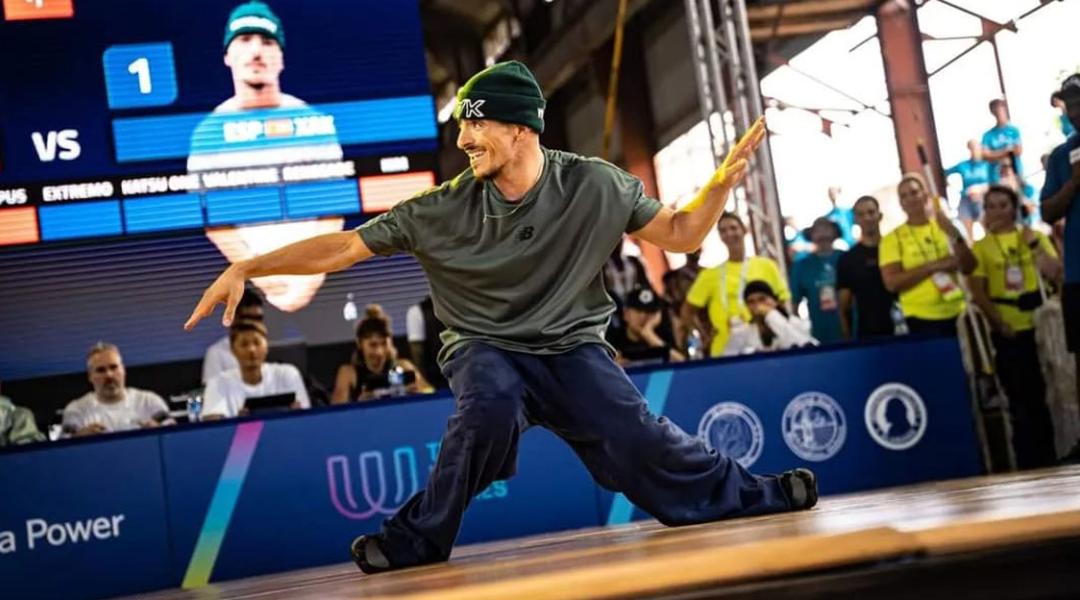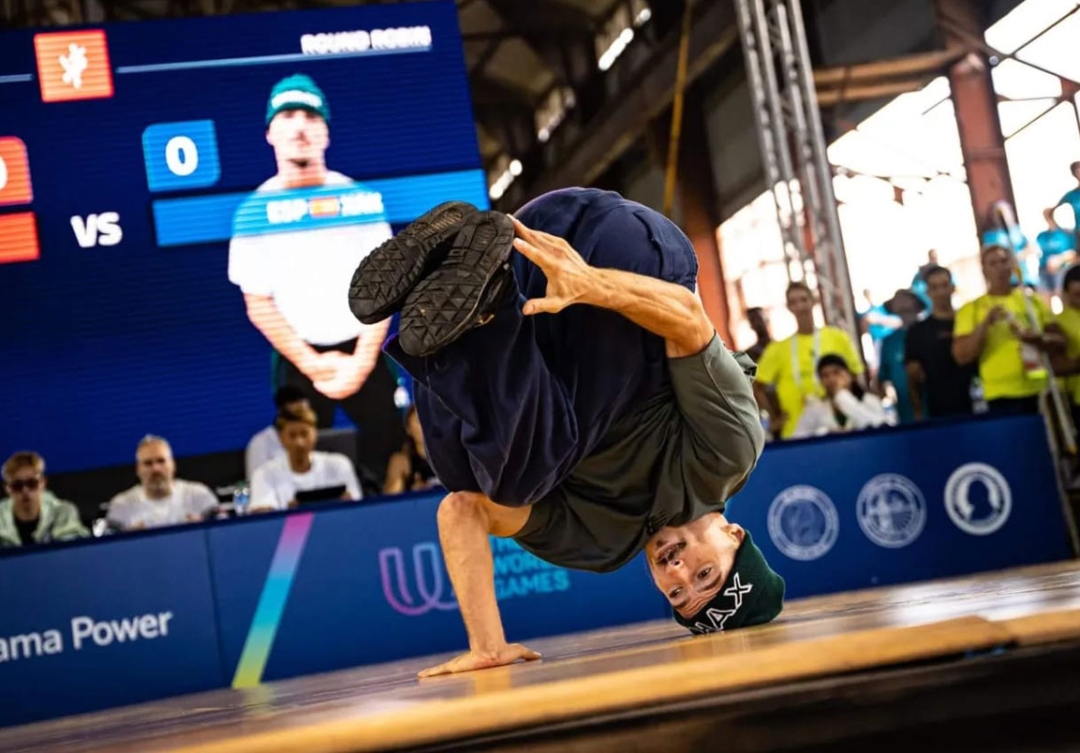Juan de la Torre (Xak)
Mind, body and soul

Breaking will make its debut at the next Olympic Games and Spain has one of the best b-boys in the world: Juan de la Torre, better known as Xak. From social dance to Olympic sport, the leap breaking has taken is similar to the one Juan has taken, from practicing in the playground as a kid until today, where he trains for several hours a day with a single goal: “Doing the best I can in Paris.”
Juan de la Torre (Lucena, 1987) discovered breaking at the age of 14 and, he concedes, it made his head explode. Two decades later, Xak, as he’s known in the sports circuit, is preparing for none other than the Olympic Games. Even he couldn’t imagine it. On the 7th of December, 2020, the International Olympic Committee (IOC) decided to include breaking in the Olympic programme and his life changed drastically: now he trains every day at the High-performance centre in Madrid alongside hundreds of other athletes, with his sights set on Paris. Beyond the opportunity that taking part in the greatest sporting event in the world entails, the part that Juan celebrates the most about the IOC’s decision is that now the parents of younger b-boys and b-girls will better understand what their children spend so much time on. “My family never fully understood what I was doing,” remembers Juan, emphasising the importance of this change in attitude. Perhaps many didn’t understand why this lawyer decided to leave everything behind to throw himself into breaking, but you only need to spend a few minutes with him to understand: it’s his passion. And he expresses it mind, body and soul.
How did breaking come into your life?
When I was 14, I changed secondary school and I didn’t know anyone in my class. There was one repeat student and, ultimately, it was like he was also new. We got together for a school project, and one day at his house, he put on some rap music and started moving his body. It made my head explode and I said: “What’s that? Teach me.” After that, we started practicing in the playground.
And what do you feel today, so many years later, when you practice it?
I feel satisfied because it’s a sport that gives you the chance to express yourself. I break dance when I’m happy and when I’m sad. You create your own vocabulary, your own language, with the movements you make. I also feel motivated by the idea that one of my movements can inspire others.
What would you say to someone young who’s inspired by you and decides to start break dancing?
Firstly, to complement it with another type of dance or training. And secondly, to not think about becoming a professional break dancer, but rather to think more about enjoying every day and the progression, which is what leads you towards meeting your goals.
“Breaking is a sport that gives you the chance to express yourself. You create your own language with the movements you make”
What has breaking being recognised as an Olympic sport meant to you?
Personally, I’d never imagined preparing for the Games, and the change has been drastic. Breaking as a sport is really demanding: the number of hours invested is ten times higher. You have to keep your motivation and belief in yourself high for four years.
You’re a worldwide role model in this discipline. Can you see yourself with a medal around your neck in Paris?
It’s such a tough mission that I prefer to think of smaller goals. But obviously, if I wasn’t motivated to classify and do the best that I can at the Games in Paris, I wouldn’t be spending so much time on it.
Some people are unwilling to consider breaking a sport. How would you refute them?
For those unfamiliar with breaking, I’d recommend watching a major professional competition, don’t just think about what you see in your neighbourhood park. I’d also recommend investigating how these people train every day. We’re often prejudiced.
After being appointed an Olympic sport, breaking has gained visibility. Have you noticed greater interest in your sport?
Yes, a bit more. The media in particular. I also feel the respect from other athletes, who see you with fresh eyes and ask you about it. But, for me, the most important change is in the parents of younger b-boys and b-girls because, although many already considered it a professional endeavour, others see it more informally. I’m the first who’s experienced that, a family who didn’t fully understand what I was doing. Now, more young people start breaking because they feel that support.

Juan de la Torre (Xak) started breaking at 14 and is now a worldwide role model. © Courtesy of Xak
How does a breaking athlete prepare for the Olympics?
We need a lot of resistance to withstand the rounds. And beyond that, what you need is the ability to recover quickly. The Olympic format is really short because it’s condensed into two days, but at the same time it’s really long because there are loads of participants and many rounds. It’s brutally exhausting and you need to be really well prepared. In my case, I spend three hours a day, six days a week on the technical side. Additionally, at the gym, I spend two days working on resistance and two more on strength and maintenance, because the movements we do require you to be in optimal physical condition and some can lead to injury.
And how important is creativity within breaking?
Very. The judging system is split into mind, body and soul. The mind precisely includes the more artistic and creative side, because each of your movements must have your own vibe, your personality. The body includes the technique, and the soul, your presence onstage and what you convey. You also depend on the music, which you don’t know until you step onstage to compete, and on your opponent, because you have to answer them. There are many factors to take into account and you need to take many decisions during an exercise.
“Any skill that brings you closer to achieving your goals involves talent”
What’s talent for you? And what does a b-boy need to be considered talented?
There are many kinds of talent. That is, I believe any skill that brings you closer to achieving your goals involves talent. In the case of breaking, this can range from being really good the technique to being able to withstand suffering. Daily motivation also comes into play, accepting that you have good and bad days, and dealing with that frustration. In the end, the most important traits are perseverance and determination. Breaking is a discipline where you need at least ten years of training to be able to defend yourself in a competition. If you’re not patient, you won’t make it. Now we live in a fast-paced society, and we’re used to achieving everything quickly... Well, breaking is the opposite of that.


